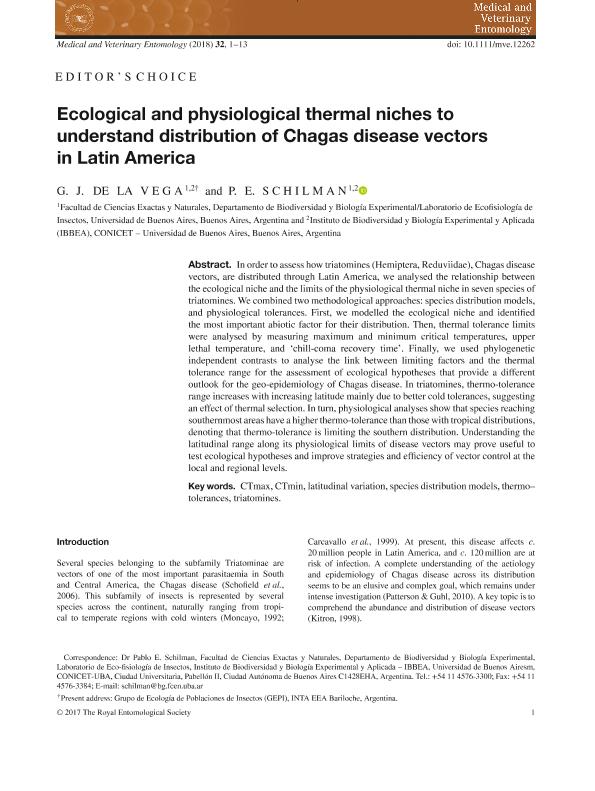Mostrar el registro sencillo del ítem
dc.contributor.author
de la Vega, Gerardo José

dc.contributor.author
Schilman, Pablo Ernesto

dc.date.available
2020-01-30T19:54:22Z
dc.date.issued
2018-03
dc.identifier.citation
de la Vega, Gerardo José; Schilman, Pablo Ernesto; Ecological and physiological thermal niches to understand distribution of Chagas disease vectors in Latin America; Wiley Blackwell Publishing, Inc; Medical and Veterinary Entomology; 32; 1; 3-2018; 1-13
dc.identifier.issn
0269-283X
dc.identifier.uri
http://hdl.handle.net/11336/96280
dc.description.abstract
In order to assess how triatomines (Hemiptera, Reduviidae), Chagas disease vectors, are distributed through Latin America, we analysed the relationship between the ecological niche and the limits of the physiological thermal niche in seven species of triatomines. We combined two methodological approaches: species distribution models, and physiological tolerances. First, we modelled the ecological niche and identified the most important abiotic factor for their distribution. Then, thermal tolerance limits were analysed by measuring maximum and minimum critical temperatures, upper lethal temperature, and ‘chill-coma recovery time’. Finally, we used phylogenetic independent contrasts to analyse the link between limiting factors and the thermal tolerance range for the assessment of ecological hypotheses that provide a different outlook for the geo-epidemiology of Chagas disease. In triatomines, thermo-tolerance range increases with increasing latitude mainly due to better cold tolerances, suggesting an effect of thermal selection. In turn, physiological analyses show that species reaching southernmost areas have a higher thermo-tolerance than those with tropical distributions, denoting that thermo-tolerance is limiting the southern distribution. Understanding the latitudinal range along its physiological limits of disease vectors may prove useful to test ecological hypotheses and improve strategies and efficiency of vector control at the local and regional levels.
dc.format
application/pdf
dc.language.iso
eng
dc.publisher
Wiley Blackwell Publishing, Inc

dc.rights
info:eu-repo/semantics/openAccess
dc.rights.uri
https://creativecommons.org/licenses/by-nc-sa/2.5/ar/
dc.subject
CTMAX
dc.subject
CTMIN
dc.subject
LATITUDINAL VARIATION
dc.subject
SPECIES DISTRIBUTION MODELS
dc.subject
THERMO-TOLERANCES
dc.subject
TRIATOMINES
dc.subject.classification
Zoología, Ornitología, Entomología, Etología

dc.subject.classification
Ciencias Biológicas

dc.subject.classification
CIENCIAS NATURALES Y EXACTAS

dc.title
Ecological and physiological thermal niches to understand distribution of Chagas disease vectors in Latin America
dc.type
info:eu-repo/semantics/article
dc.type
info:ar-repo/semantics/artículo
dc.type
info:eu-repo/semantics/publishedVersion
dc.date.updated
2019-10-02T19:11:44Z
dc.journal.volume
32
dc.journal.number
1
dc.journal.pagination
1-13
dc.journal.pais
Reino Unido

dc.journal.ciudad
Londres
dc.description.fil
Fil: de la Vega, Gerardo José. Consejo Nacional de Investigaciones Científicas y Técnicas. Oficina de Coordinación Administrativa Ciudad Universitaria. Instituto de Biodiversidad y Biología Experimental y Aplicada. Universidad de Buenos Aires. Facultad de Ciencias Exactas y Naturales. Instituto de Biodiversidad y Biología Experimental y Aplicada; Argentina. Universidad de Buenos Aires. Facultad de Ciencias Exactas y Naturales. Departamento de Biodiversidad y Biología Experimental; Argentina
dc.description.fil
Fil: Schilman, Pablo Ernesto. Consejo Nacional de Investigaciones Científicas y Técnicas. Oficina de Coordinación Administrativa Ciudad Universitaria. Instituto de Biodiversidad y Biología Experimental y Aplicada. Universidad de Buenos Aires. Facultad de Ciencias Exactas y Naturales. Instituto de Biodiversidad y Biología Experimental y Aplicada; Argentina. Universidad de Buenos Aires. Facultad de Ciencias Exactas y Naturales. Departamento de Biodiversidad y Biología Experimental; Argentina
dc.journal.title
Medical and Veterinary Entomology

dc.relation.alternativeid
info:eu-repo/semantics/altIdentifier/doi/https://doi.org/10.1111/mve.12262
dc.relation.alternativeid
info:eu-repo/semantics/altIdentifier/url/https://onlinelibrary.wiley.com/doi/full/10.1111/mve.12262
Archivos asociados
